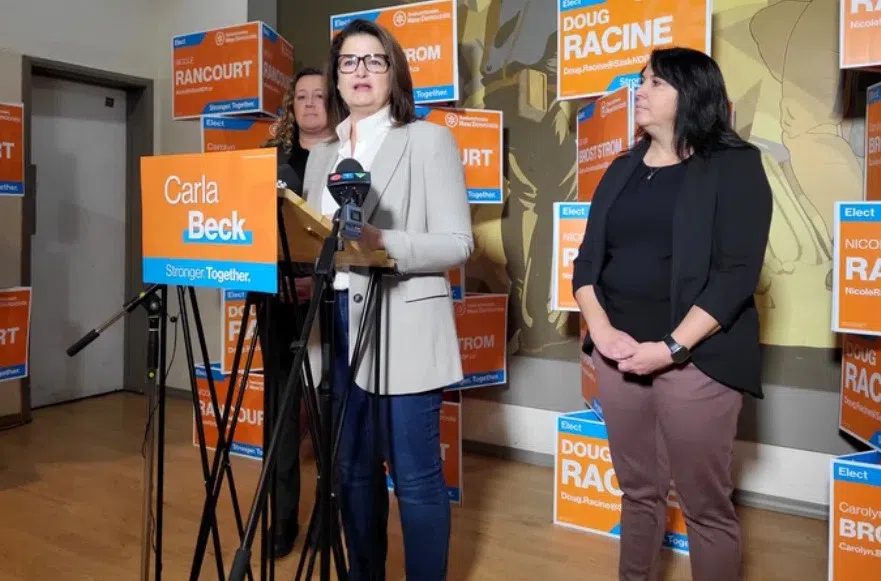By Susan McNeil
In Prince Albert on Wednesday, NDP leader Carla Beck announced that if elected premier, her first move will be to pause a tax she has long been challenging the Sask. Party on, the gas tax.
“Not only do we have a plan to freeze taxes, we’re going to cut them. We plan to save you more money right away, immediately suspending the gas tax, saving Prince Albert residents $365 in the first six months alone,” Beck said.
Other provinces, Albert and Manitoba most notably, paused their excise taxes on fuel for months during the height of pandemic inflation.
They will also reverse the PST on children’s clothing and groceries.
The NDP said that the biggest concern they hear from residents is the increased cost of living.
Beck, flanked by local candidates Carolyn Brost-Strom (Prince Albert—Carlton) and Nicole Rancourt (Prince Albert–Northcote) spoke to media and supporters from their campaign office in the city’s downtown.
“I hear daily about the rising costs facing families in this province,” she said. “And while the Sask. Party spent years doing nothing, watching problems grow, and sometimes even making them worse.”
Less welcome news for residents, however, might be the plan to scrap the Marshal’s Service, which has its headquarters in Prince Albert. Funding for the service is over $20 million and includes 70 officers, many of whom call the city home.
Beck said that money is better spent on city police forces and the NDP along with addressing the root cause of increased crime: addictions and mental health issues.
As to how her plan would play out locally, she recalled talking to a police chief in 2016 who pointed out the increasing crime rates.
“I remember asking what’s driving this crime and he told me very clearly the concerns were largely centered around mental health and rising problems with addiction,” she said.
The Sask. Party under Moe has not stopped a 35 per cent increase in crime, said the NDP.
“In Prince Albert, the increase in violent crime is 66 per cent. We will never have enough police if we don’t start to address the root causes of crime,” Beck said.
One of the most effective ways to prevent crime is to help children when they need it, she stated, and right now that is not happening in schools.
Her party would focus on reducing the wait time for child psychiatrists. Prince Albert lost its 10 child psych beds in 2023 after the only psychiatrist working with young people left.
The doctor said at the time he was overworked and overwhelmed as there needed to be two psychiatrists to fill the need. The province has been hunting for replacements to no avail ever since.
“It’s about having an effective plan, working with communities, working with frontline officers, working with schools to ensure that people have the services they need before they get further and further down the line with addictions, mental health and homelessness,” Beck said.
Another point of challenge between the NDP and the Saskatchewan Party has been how the CIS program was handled and its impact on homelessness.
Rather than having the support money allocated for rent and utilities go to landlords and the service providers, the money was sent directly to clients.
In some cases, that has been reversed for clients who are unable to manage their finances. One homeless advocate in Prince Albert said in the past she estimated about 70 per cent of the people she worked with could manage their own finances.
The rest could not and never would be able to because, in many cases, they had a condition such as a brain injury that prevented it.
“When people make mistakes, when we see a government actively going against advice, being told that this change is going to make homelessness, it’s going to make mental health and addictions worse in our communities,” Beck said. “They stubbornly plow ahead with it, refuse to listen only to see people and communities suffer, I think that’s unforgivable.”
Recent polls show both Prince Albert ridings leaning orange in the upcoming election, as do many urban seats.
That doesn’t translate into a government, however, and the NDP needs to find a way to reach rural voters who tend to support the Sask Party.
This is a challenge Beck acknowledged and said they have changed their outreach as a result and have been spending time in a lot of communities they have not been to in a while.
She said at the end of the day families are facing the same issues in all communities, people are working harder and harder and finding it more difficult at the end of the month to pay their bills.







